Current research reports show that type 2 diabetic patients are being over-treated with glucose-lowering and insulin drugs. The reports show that taking these prescription drugs provide more risks and hassles than benefits showing that diabetic drugs could be causing more harm than good.
Lead author Sandeep Vijan M.D., M.S., professor of Internal Medicine at the U-M Medical School and research scientist at the Center for Clinical Management Research at the VA Ann Arbor Healthcare System states, “For people with type 2 diabetes, the goal of managing blood sugar levels is to prevent associated diabetes complications, such as kidney, eye and heart disease, but it is essential to balance complication risks and treatment burdens.”
For diabetic patients over the age of 50, negative impacts of diabetic medication can include side effects like weight gain and the hassle of taking frequent insulin shots, which is far more troubling and the benefits of taking the drugs less desirable.
New findings support that diabetic medications are keener in the overall benefits of the drug for safety and side effects than the impact it is actually making on blood sugar.
Vijan, “For people with type 2 diabetes, the goal of managing blood sugar levels is to prevent associated diabetes complications, such as kidney, eye and heart disease, but it is essential to balance complication risks and treatment burdens when deciding how aggressively to treat blood sugars.”
“If you’re a patient with fairly low complication risks, but are experiencing symptoms from low blood sugar, gaining weight or find frequent insulin shots to be disruptive to your daily life, then the drugs are doing more harm than good.
Prescribing medicine isn’t just about reducing risks of complications, but also about helping patients improve their quality of life.”
Vijan suggests that once moderate levels of glucose control are reached that the medication does very little for added benefits to blood sugar treatment. However, treatments costs, risks and hassles of taking said medication steadily increase.
Rodney Hayward, M.D., professor of medicine in the U-M Medical School and senior research scientist at the Center for Clinical Management Research at the VA Ann Arbor Healthcare System said, “Drugs that lower blood sugar levels are extremely beneficial in some patients but offer almost no benefit for others. These results have major implications for the millions of people who are currently being told that they need to increase medication in order to achieve their ‘glucose goal.”
“Current quality measures do not allow doctors and patients to make good decisions for each patient because they emphasize reaching targets instead of thinking of the risks and benefits of starting new medications based on individual circumstances and preferences.”
